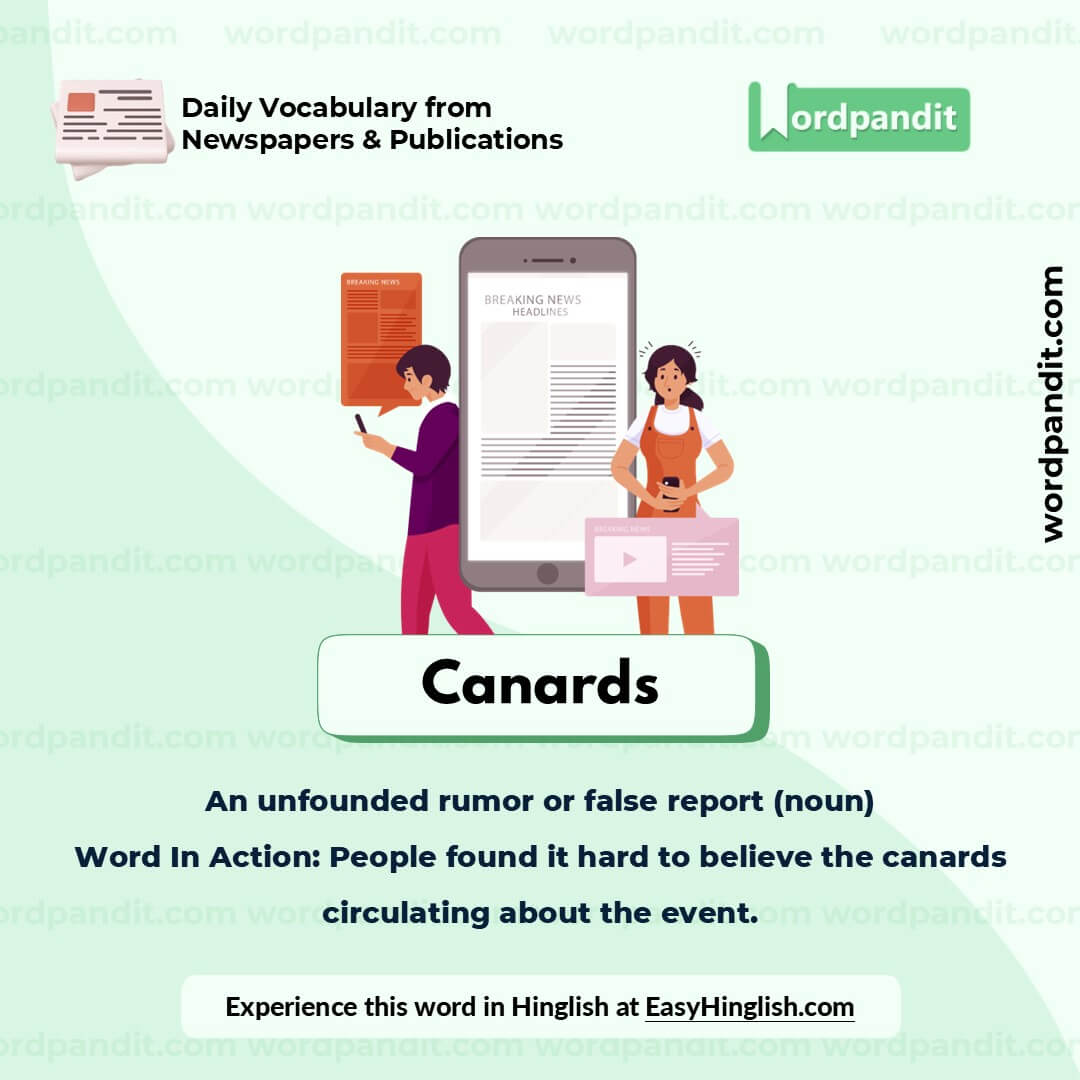Daily Vocabulary from Indian Newspapers and Publications
Welcome to Wordpandit’s Indian Vocabulary Hub
At Wordpandit, we understand the importance of staying rooted in the local context while expanding your language skills. This section focuses on enriching your vocabulary with words and phrases drawn from India’s leading newspapers and publications, ensuring you're learning vocabulary that is practical, relevant, and uniquely Indian.
Why Indian Sources Matter
We believe that the best way to master any language is by immersing yourself in local content. That’s why we carefully curate vocabulary from top Indian publications, including:
- The Hindu
- The Times of India
- The Economic Times
- Hindustan Times
- Live Mint
- The Indian Express
- And many others...
Stay Updated, Stay Relevant
With daily updates from Indian news sources, you’ll be consistently learning words that reflect the trends and shifts in Indian society and culture. Our focus is to provide vocabulary that enhances your understanding of the language in an Indian context.
How Wordpandit Supports Your Goals
Whether you’re preparing for exams, aiming to improve your professional communication, or simply want to stay connected with the latest Indian vocabulary, Wordpandit is here to guide you every step of the way.
Learn with a Practical Approach
Our interactive learning methodology includes real-world examples, engaging activities, and context-specific usage to ensure that every word becomes part of your active vocabulary.
Dive into Indian Vocabulary Today!
Why Choose Wordpandit?
Practical Learning: Focus on words you'll actually encounter in real-world reading, enhancing your comprehension and communication skills.
Diverse Content: From current affairs to scientific breakthroughs, our varied sources expose you to vocabulary across multiple domains.
Effortless Integration: Make Wordpandit a part of your daily routine. Just a few minutes each day can significantly boost your lexicon over time.
Your Path to Vocabulary Mastery
- Visit our Daily Vocabulary section regularly
- Explore new words and their usage in context
- Practice incorporating these words into your own writing and speech
- Track your progress as your vocabulary expands
Start Your Journey Today
Embark on your vocabulary enhancement journey with Wordpandit. By consistently engaging with our daily posts, you'll build a robust vocabulary that serves you well in academic, professional, and personal contexts.
Remember, a word a day keeps linguistic limitations at bay. Make Wordpandit your daily companion in the quest for vocabulary excellence!
WORD-1: Colluding
Context:
"The allegations of the Communist Party of India (Marxist) colluding with the Rashtriya Swayamsevak Sangh are being levelled by the Opposition." - The Hindu
Explanatory Paragraph:
To collude means to secretly work with others, often for deceitful or illegal purposes. When political groups or organizations collude, they are accused of conspiring behind closed doors to achieve mutual benefits at the expense of transparency and fairness.
Meaning: To work together secretly for a dishonest purpose (verb)
Pronunciation: kuh-LOOD
Difficulty Level: ⭐⭐⭐ (Intermediate)
Etymology: From Latin colludere, meaning "to play together," from com- (together) + ludere (to play)
Synonyms & Antonyms:
Synonyms: conspire, scheme, plot, connive
Antonyms: cooperate, collaborate, assist, work openly
Usage Examples:
- The two companies were accused of colluding to fix prices in the market.
- Political rivals are often suspected of colluding with external forces.
- The manager was fired after being caught colluding with suppliers to embezzle funds.
- The opposition leader claimed that several lawmakers were colluding to undermine the democratic process.
Cultural Reference:
"The worst crimes were dared by a few, willed by more, and tolerated by all." – Tacitus, reflecting on the dangers of collusion within political systems.
Think About It:
Why is colluding often viewed as more harmful than openly opposing someone or something?
Quick Activity:
Write a brief story where two characters collude to achieve a goal. What are the consequences of their actions?
Memory Tip:
Think of "colluding" as "conspiring in secret" — both words start with "co," reminding you of a partnership in wrongdoing.
Real-World Application:
The term "colluding" is often used in political contexts to describe secret deals between groups that undermine transparency and public trust.
WORD-2: Canards
Context:
"No one in Kerala can believe these canards." - The Hindu
Explanatory Paragraph:
A canard is a false or misleading story that is spread with the intention of deceiving people. It refers to a fabricated rumor or lie that is often used in media or politics to manipulate public opinion or damage someone's reputation.
Meaning: An unfounded rumor or false report (noun)
Pronunciation: kuh-NARD
Difficulty Level: ⭐⭐⭐ (Intermediate)
Etymology: From French canard, meaning "duck," based on an old phrase "to half-sell a duck," meaning to fool someone with a fake deal.
Synonyms & Antonyms:
Synonyms: hoax, lie, falsehood, fabrication, rumor
Antonyms: truth, fact, reality, veracity
Usage Examples:
- The politician dismissed the allegations as mere canards spread by his opponents.
- Journalists must be careful not to publish canards without verifying their sources.
- The rumor about the company going bankrupt turned out to be a complete canard.
- Social media has made it easier for canards to spread quickly among the public.
Cultural Reference:
"A lie can travel halfway around the world while the truth is putting on its shoes." - Often attributed to Mark Twain, reflecting how quickly canards can spread.
Think About It:
Why do people often believe canards, even when there is no evidence to support them?
Quick Activity:
Write about a time when you or someone you know believed a canard. How was the truth eventually revealed?
Memory Tip:
Think of a "canard" as a "quack," since both words are connected to ducks, and quacks are associated with fake doctors or deception.
Real-World Application:
The word "canard" is often used in the media to describe fabricated stories or misleading rumors that spread misinformation.
WORD-3: Complacent
Context:
"We are however not complacent." - The Hindu
Explanatory Paragraph:
To be complacent means to feel so satisfied with yourself or your achievements that you stop trying to improve or change. Complacency often leads to a lack of progress because it creates a false sense of security and discourages further effort.
Meaning: Showing smug or uncritical satisfaction with oneself or one's achievements (adjective)
Pronunciation: kuhm-PLAY-suhnt
Difficulty Level: ⭐⭐⭐ (Intermediate)
Etymology: From Latin complacere, meaning "to please thoroughly."
Synonyms & Antonyms:
Synonyms: self-satisfied, smug, content, unconcerned
Antonyms: anxious, concerned, dissatisfied, driven
Usage Examples:
- After winning several awards, the team became complacent and their performance declined.
- The government warned citizens not to become complacent about safety measures during the pandemic.
- Success can sometimes make people complacent, leading them to ignore potential risks.
- She knew that becoming complacent in her studies would prevent her from achieving her long-term goals.
Cultural Reference:
"Success is a lousy teacher. It seduces smart people into thinking they can't lose." - Bill Gates, a reminder of how complacency can follow success.
Think About It:
Why do people become complacent after achieving success, and how can they stay motivated to improve?
Quick Activity:
Write about a time when you felt complacent about something. What could you have done differently to stay motivated?
Memory Tip:
Think of "complacent" as "comfortable" and "patient," which reminds you of someone becoming too comfortable and no longer pushing themselves.
Real-World Application:
The word "complacent" is often used in business and leadership to warn against the dangers of becoming too satisfied with current achievements and not striving for further progress.
WORD-4: Extremist
Context:
"Muslim extremist elements." - The Hindu
Explanatory Paragraph:
An extremist is someone who holds radical views or takes actions that are far outside the accepted standards of society. Extremists often push for extreme changes, sometimes using violence or aggressive tactics to achieve their goals, and their beliefs are typically seen as far too severe by mainstream society.
Meaning: A person who advocates extreme political, religious, or social ideas, often using aggressive or violent methods (noun)
Pronunciation: ik-STREE-mist
Difficulty Level: ⭐⭐⭐⭐ (Advanced)
Etymology: From Latin extremus, meaning "utmost, last," used in modern terms to describe far-reaching, radical actions or beliefs.
Synonyms & Antonyms:
Synonyms: radical, fanatic, zealot, hardliner
Antonyms: moderate, centrist, conservative, pacifist
Usage Examples:
- Extremist groups often reject any form of negotiation or compromise.
- The government is cracking down on extremist activities in the region.
- His extremist views on politics alienated him from many of his friends.
- The rise of extremist rhetoric in the media has raised concerns about political violence.
Cultural Reference:
"The fanatic is always concealing a secret doubt." - Aldous Huxley, emphasizing the danger of extremist thinking rooted in insecurity.
Think About It:
What leads individuals or groups to adopt extremist views, and how can societies prevent radicalization?
Quick Activity:
Research a historical event where extremism led to significant conflict or change. Write a summary of how extremist views played a role.
Memory Tip:
Remember "extremist" by associating it with "extreme" behavior or beliefs that go beyond what is normal or acceptable.
Real-World Application:
The term "extremist" is often used in discussions of terrorism, politics, and social movements to describe individuals or groups that promote radical actions, sometimes through violence or coercion.
WORD-5: Alacrity
Context:
"In other instances, the Centre had shown unusual alacrity." - The Hindu
Explanatory Paragraph:
Alacrity refers to a cheerful readiness or eager willingness to do something. When someone approaches a task with alacrity, they are enthusiastic and quick to act, showing a positive, can-do attitude.
Meaning: Brisk and cheerful readiness (noun)
Pronunciation: uh-LAK-ri-tee
Difficulty Level: ⭐⭐⭐ (Intermediate)
Etymology: From Latin alacritas, meaning "liveliness, eagerness."
Synonyms & Antonyms:
Synonyms: eagerness, enthusiasm, zeal, promptness
Antonyms: reluctance, hesitance, apathy, indifference
Usage Examples:
- The students responded to the teacher's request with alacrity, eager to help.
- She accepted the job offer with alacrity, excited to start her new role.
- He volunteered with alacrity, showing his enthusiasm to contribute to the cause.
- The team prepared for the meeting with alacrity, ensuring everything was ready on time.
Cultural Reference:
"The surest way to reveal one's character is to observe how they respond to opportunities with alacrity." - Paraphrase of a common observation about eagerness and attitude.
Think About It:
Why do you think some people approach challenges with alacrity, while others hesitate or procrastinate?
Quick Activity:
Write about a situation where you acted with alacrity. What motivated you to be so eager and responsive?
Memory Tip:
Think of "alacrity" as "alert" and "eager," helping you remember its meaning of being quick and enthusiastic to act.
Real-World Application:
Alacrity is an important quality in workplaces and personal life, where being eager and ready to respond quickly can lead to success and positive results.


















